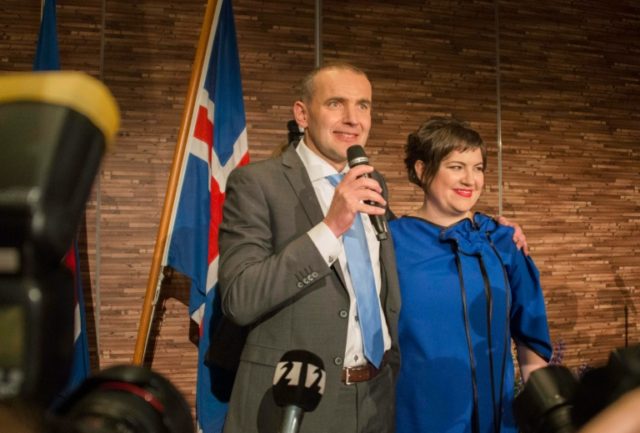Reykjavik (AFP) – History professor Gudni Johannesson won Iceland’s presidential election after riding a wave of anti-establishment sentiment, final results showed Sunday, although the vote was eclipsed by the country’s eagerly-anticipated Euro football match.
The political newcomer, who won with 39.1 percent of votes, was trailed by businesswoman Halla Tomasdottir, also without party affiliation, who took 29.4 percent, according to results announced on public television channel RUV.
Johannesson only decided to run for the presidency after the so-called Panama Papers leak in April which detailed offshore accounts and implicated several senior Icelandic politicians, including the prime minister who was forced to resign.
Throughout the campaign, Johannesson emphasised his non-partisan vision of the presidency, and vowed to restore faith in the political system after years of public anger toward politicians over scandals and financial woes.
The victory was especially sweet for the history professor and political commentator, who has never held public office and has no party affiliation, as he celebrated his 48th birthday Sunday.
David Oddsson, a former conservative prime minister who had been Johannesson’s closest rival throughout most of the campaign, garnered just 13 percent of votes.
“The representative of the old era… has been rejected, people are looking to the future,” University of Akureyri political science professor Gretar Eythorsson told AFP.
The president in Iceland holds a largely ceremonial position. More important legislative elections are due in the autumn.
But the outrage that fuelled mass street protests in April and led to ousting of premier Sigmundur David Gunnlaugsson appeared to have dissipated somewhat as euphoria erupted over the Icelandic football squad achieving a historic feat in the Euro 2016 football tournament.
A North Atlantic island of just 334,000 people, Iceland beat Austria 2-1 on Wednesday to qualify for the last 16 in its first major international competition, and will face off against England on Monday.
Britain’s vote to leave the European Union also headlined the news on the eve of the election in Iceland, which itself had applied for EU membership in 2009 after suffering a devastating financial crisis in 2008, but abandoned the bid six years later.
Like most of Iceland’s voters, Johannesson is opposed to EU membership.
In a final debate on Friday, he said Brexit changes “much for the better for us Icelanders,” suggesting the European Economic Area agreement that non-EU members Norway and Iceland have with the EU could play a more important role with Britain on board.
– ‘A different kind of president’ –
Current president Olafur Ragnar Grimsson, 73, is stepping down after five straight terms spanning 20 years.
“I think we will see a different kind of president. Johannesson is not likely to be as political as Grimsson sometimes was,” Eythorsson said.
Grimsson is the only Icelandic president to have exercised his right to veto bills in parliament, doing so three times over two decades.
Johannesson was until recently known to Icelanders as one of the country’s most prominent political commentators from the University of Iceland.
In a nation basking in a strong economy, low unemployment and robust purchasing power, Johannesson’s views are generally seen as moderate and centrist.
Casting his ballot Saturday, Johannesson told AFP he was satisfied he had “managed to present to the people my vision of the presidency”.
Asked what his first task would be if he were to win, he replied: “Go to France on Monday and see Iceland play England.”
Between 10,000 and 20,000 Icelanders are in France to watch the Euro, an astounding number for such a small country.
Turnout in the election was also higher than in the last vote four years ago, at nearly 76 percent.
Johannesson officially takes over the post on August 1.

COMMENTS
Please let us know if you're having issues with commenting.